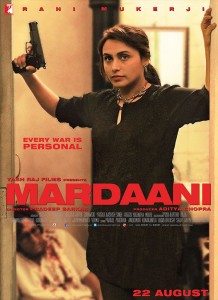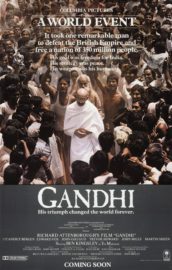The dabbawalas of Mumbai have shot to global fame, getting invited for the royal wedding and also giving guest lectures in some of the business schools in India. Now comes a film that tells the story of a gentle romance that blossoms in the swarming city of Mumbai between a young housewife and a middle-aged man. THE LUNCHBOX is a story of a beautiful relationship triggered by the wrong delivery of a lunchbox that’s delivered daily within the bustling metropolis of Mumbai.
A well-told old-fashioned romance, THE LUNCHBOX gracefully unknots the trials, tribulations, fears and hopes of everyday people sans the glamour that the city of Mumbai has become synonymous with. It also brings back memories of the days when people used to communicate through hand-written letters… and cell phones and emails were unheard of.
Ila [Nimrat Kaur], a young housewife, tries to gain the attention of her husband [Nakul Vaid] via the paraphrased route ‘the way to a man’s heart is through his stomach’. However, despite her exquisite culinary skills and of course, the aid and constant prodding by a voice from the ‘aunty’ upstairs, Ila desolately fails. However, all’s not lost as the meticulously cooked dabba lands on the table of an unknowing and seemingly normal Saajan [Irrfan Khan].
Later realizing the mistake when her husband returns home, Ila encloses a note for the new recipient. By this one-in-a-million mistake, the lives of two distinctly different individuals clash, leading to a romantic revival of familiarity through written correspondence in the age of emails.
As the conversations between the two prolong, the topic shifts from the basic food to that of their lives, letting each individual open up more about themselves. As the film progresses, Ila, a confused housewife, emerges a more confident woman who is ready to take a decision. As for Saajan, he metamorphoses from a gloomy, close-to-retirement government employee to that of a man searching for his long-lost soul mate.
Debutant director Ritesh Batra does a magnificent job of encapsulating the interminable restlessness of a city that is constantly on the go. While doing so, he expertly gives voice to the fears that constantly plague the minds of individuals though the exchange of hand-written letters, besides infusing that certain soul, warmth and compassion in the narrative. He also deserves kudos for choosing an unconventional plot, combining romance and food that’s sure to strike a chord with cineastes. In fact, it won’t be erroneous to state that the film’s strength lies in its simplistic plot and an unfussy screenplay, besides the striking performances of its principal actors.
Irrfan illustrates yet again that he’s one of the finest talents to come out of India. Just recall his body of work and you’d agree that he’s a volcano of talent that leaves you completely enthralled with noteworthy performances in film after film. The question is, is there something Irrfan can’t do? Nimrat is the find of the year, truly. To stand up to talents like Irrfan and Nawazuddin in a film and yet retain your individualistic identity is nothing short of an accomplishment. Nawazuddin is absolutely flawless, essaying his part with flair.
Denzil Smith, Bharti Achrekar [never seen but heard in the film], Nakul Vaid and Lillette Dubey add spice to their respective parts.
On the whole, THE LUNCHBOX is a standout film, a sumptuous treat that’s sure to be relished by connoisseurs of cinema. A film with a big heart, it makes you realize that you can unearth contentment and pleasure even if you board the wrong train. Easily one of the finest films to come out of India.
Rating: 4/5
https://www.bollywoodhungama.com/moviemicro/criticreview/id/588497
Tags: Irfan Khan Nakul Vaid Nawazuddin Siddiqui Nimrat Kaur Reviews Taran Adarsh The Lunchbox






As expected rave reviews everywhere. Good Good.
Have to see this movie now (all the reviews till now are fantastic) !!!!
The Lunchbox Movie Review by Rajesen
The Lunchbox is the best Indian film in years
Raja Sen feels The Lunchbox is this generation’s Masoom.
One of my favourite parts in The Lunchbox is when a character buys himself a painting.
No, sorry, scratch that; it is when a character narrates how and why he bought a painting.
It is a street-side purchase of a street-side scene: an artist at a scenic vantage point draws the same backdrop over and over again, but with varied details each time, his mental snapshot making each picture a wholly different capsule of captured time.
It is here that Mr Fernandez spots a likeness of himself, as a part of the throng — not that unlikely an occurrence, given that he has walked that stretch nearly every day for decades and decades. Usually a reticent man, he allows himself this rare moment of vanity and buys the painting. And then he tells — or, indeed, confesses — all of this to a stranger.
There is so much to love here — Mr Fernandez’s discovery; the uncharacteristic puffing up of his chest; the need to boast about what is not an accomplishment but feels certainly like a triumph — that this short, beautiful tale of an accidental portrait could well turn into a film all its own.
And yet in Ritesh Batra’s film, this is but a throwaway scrap of a very special conversation. The film assuredly glides past this gem instead of dwelling on it, and, in the process, enriches its own narrative.
That, ladies and gentlemen, is how good The Lunchbox is, and how honest its storytelling rings.
Ritesh Batra’s film — about a city and serendipity — might be about unremarkable folk, but it is a masterfully made and diligently restrained effort, one that impresses a viewer without impressing upon a viewer.
It is a simple story with unanimous appeal, told with unshowy efficacy, and yet The Lunchbox is the most fascinating film to come out of Bombay in a very, very long time. In many ways — not least because it is an astonishing directorial debut — The Lunchbox is this generation’s Masoom. The Mumbai dabbawala is a miracle, a human cog with clockwork precision who operates, it seems, well outside Mumbai’s haphazard universe, and yet fuels the mercenaries shovelling coal into the city’s ever-open maw.
The Lunchbox begins with a dabbawala getting it wrong, odds of which happen to be one in six million. But then this is a film about happenstance, a wondrous what-if movie that lifts us from realism to something far better, and it’s only fair that — in ways unique to itself — the city conspires, throughout the film, to set these events into motion, to champion this unlikely romance, to give us hope.
For Mumbai has always motored along on magic.
Thus, one fine afternoon, the city mistakes a widower for a husband and delivers him lunch. Lunch a wife laboured over, with much fondness and desperation, keen to surprise and amaze and seduce.
The meal licked clean, the steel tiffin-box returns home atypically empty. And when the widower discovers that the neighbourhood eatery hasn’t suddenly upped its game, and the wife discovers her husband hasn’t even missed her cooking, the two strike up a correspondence.
The parallels with The Shop Around The Corner (and its cinematic granddaughter You’ve Got Mail) are obvious but unwarranted: the letters exchanged in The Lunchbox are less conversational, more confessional.
He writes to her in English, writing initially for his own catharsis than any sense of communication, and she writes back in Hindi, giving away intimacies as if she thinks he might not understand the language that well.
They are letters written with the kind of comfortable candour one finds in the neighbouring seat of an airplane, for example, candour that exists because the speakers aren’t likely to meet again and can thus speak their minds.
In this film’s case, they never meet.
Not that it gets in the way of their spirited romance. For that’s what this is, a film where Ila discovers cracks in her marriage and can mention them only to the stranger eating (and, indeed, critiquing) her cooking, and where the quiet Mr Fernandez — with a first name that delightfully belies his reclusive nature — rediscovers VHS-era laughter.
There is much to smile at throughout this film as the two get to know each other and, in the process, tap into suppressed sides of themselves.
All while Mumbai, impossible Mumbai, takes each of their individual soundtracks (hers from a neighbour’s cassette-player, his from kids on a train) and melds them together.
Irrfan Khan plays Mr Fernandez with a superb placidity, a clock-obeying government employee who treasures silence. Khan clearly relishes the amount of internalisation the role allows him, and savours the quiet, thoughtful, melancholy beats of the film, unhurried but with his timing immaculate.
He delivers his few lines with fantastic ease — a deadpan gag about a blind man stands out — but soaks up the silences even better: a scene where he reads a novel with one hand while eating his dinner with the other speaks, like this performance, volumes while keeping mum.
A scene he stares up at an unmoving ceiling fan, with disbelief and a (momentarily justifiable) tinge of fear, is overwhelmingly good.
Khan is a magnificent actor who keeps getting better, and this is him at his finest.
Enchanting him is Nimrat Kaur whom we haven’t met before, but now, I daresay, shall be besotted with as a nation. Ila’s brow is frequently furrowed and her eyes wide, and Kaur pulls off the role of a wife with a world on her shoulders very impressively.
It is a disarmingly natural performance that is impossible to forget and difficult to analyse, and in this limited space one may merely express admiration. There is a beautiful bemusement to most of her actions, as if she, initially can’t believe the world she has made for herself, and later can’t believe the world the letters are tugging her toward.
She cooks like someone who genuinely loves it, with an effortless sensuality and a discernible joy in the more meticulous preparations.
She’s excellent, and her character is strengthened by the terrific addition of an off-screen neighbour who lives above Ila’s flat and loves to help — and to gloat.
The always-great Bharati Achrekar is a treat as this invisible Aunty, and provides invaluable narrative thrust to a film that ambles along nice and slow. Similarly critical is Fernandez’s subordinate Aslam, a long-winded rookie the senior is supposed to show the ropes.
Nawazuddin Siddiqui plays it relentlessly, bearing down on the taciturn Fernandez with irresistibly good-natured oafishness. He’s a mess, full of lies and insecurity and files smelling of the vegetables he chops on them during the train-ride back home, but in a film where the leads are quiet and cocoon their cards too close to their chests, Aslam is the one yanking the narrative with furious urgency, making things happen or, at the very least, talking about things happening.
Batra, who has also written The Lunchbox, has allowed his smashing actors tremendous room to improvise, all the while himself sketching in nuanced details about the city, its food-ferriers, and the many disparities Mumbai is crammed with.
It is a film of multiple pleasures — small ones and overwhelming ones and exquisitely crafted ones — layered one on top of the other, with something for everyone, and so, so much for the cinematic glutton.
Like the dabbawalas he loves, this director delivers.
Rating: 5/5
https://www.rediff.com/movies/review/review-the-lunchbox-is-the-best-indian-film-in-years/20130920.htm
I am all excited for this one.. Seems like one of those films which Indian cinema can be proud of.
The Lunchbox Movie Review by Rajeev Masand
Rating: 5
September 20, 2013
Cast: Irrfan Khan, Nimrat Kaur, Nawazuddin Siddiqui, Lilette Dubey, Nakul Vaid, Bharati Achrekar
Director: Ritesh Batra
In an age when instant messaging, email, and various social media have made communication easier and quicker, debutant writer-director Ritesh Batra relies on scribbled notes tucked in tiffin boxes to deliver a charming, old-fashioned love story in The Lunchbox. There’s a simple line in this sumptuous film that captures its essence beautifully: “Sometimes even the wrong train can take you to the right destination.” It’s a line that might help interpret the film’s open ending, but one that also nicely sums up its unique premise.
Neglected housewife and caring mother Ila (Nimrat Kaur), determined to spice up her loveless marriage, heeds the advice of a well-meaning Aunty in the flat upstairs (a terrific Bharati Achrekar, heard but never seen) and whips up a killer meal for her husband. But as luck would have it, a rare error in Mumbai’s famously efficient dabbawala service results in the tiffin landing up at the desk of a grumpy accountant on the verge of retirement, a widower named Saajan Fernandes (Irrfan Khan). On realizing that her lovingly prepared meal was eaten by someone else, Ila encloses a note in the steel lunchbox the following day. Saajan writes back and this pair of strangers begins a tentative friendship through routinely exchanged letters, sharing with each other their dreams, their memories of loved ones snatched away, and their empty lives.
As much a love letter to Mumbai as it is a searing portrait of loneliness, The Lunchbox unfolds against the bustle of this teeming city. Batra and his cinematographer give us skillfully composed sequences of a dabba’s long journey from the kitchen to the desk of its intended recipient. We travel with our characters in local trains, buses and taxis; we go into Ila’s middle-class cheek-to-jowl apartment block to Saajan’s modest Bandra cottage and the dull government office he has worked 35 years at. It’s a metro bursting at its seams, and yet our protagonists are lost souls here.
The third wheel in this story is Nawazuddin Siddiqui’s character Shaikh, a younger officer poised to take over from Saajan. Cheery, optimistic and always making the most of an opportunity, Shaikh forges a bond with the taciturn Saajan despite the dour older man’s initial reluctance. You see flashes of Mumbai in Shaikh’s personality – it is a city that invites you to embrace it with all its flaws. Nawazuddin is wholly endearing and funny in the role; we’re unaccustomed to seeing the actor in this light and it’s a sheer delight.
Still, it is the two central actors that grab hold of your attention in this story. Irrfan Khan, as the loner who loosens up when he falls in love, makes a nuanced role seem deceptively simple, yet gives Saajan emotional heft. With The Lunchbox, Irrfan adds another inspired performance to his extraordinary repertoire. The surprise ingredient here is the relatively unknown Nimrat Kaur as Ila. Playing an insecure hausfrau who gradually blossoms into her own person, the actress doesn’t take one wrong step. Spending much of the film alone, she makes Ila entirely believable, yet infuses her with an irresistible luminosity.
The unseen hero of this delicious love story is writer-director Ritesh Batra who pulls off a near perfect script that’s reflective of a city and the people that live in it. Through the relationships his characters share, Batra displays a great understanding of human nature, embracing its many complexities. He also masterfully blends food into this narrative, turning it into such a sensory experience that you want to rush out of the cinema and tuck into a lovely meal. The single false note in this bittersweet symphony is Lilette Dubey, a tad over-made up, her performance uncharacteristically melodramatic for this subtle film.
I’m going with five out of five for The Lunchbox. The greatest love stories are the ones that make you root for the protagonists to come together, despite their destinies. This film illustrates how love transforms the unlikeliest of people; it breaks down Saajan’s walls and gives Ila the courage to fly. Treat yourself to The Lunchbox – it’ll leave you with a craving to seek your own little happiness. Best film I’ve seen in a long time.
Link